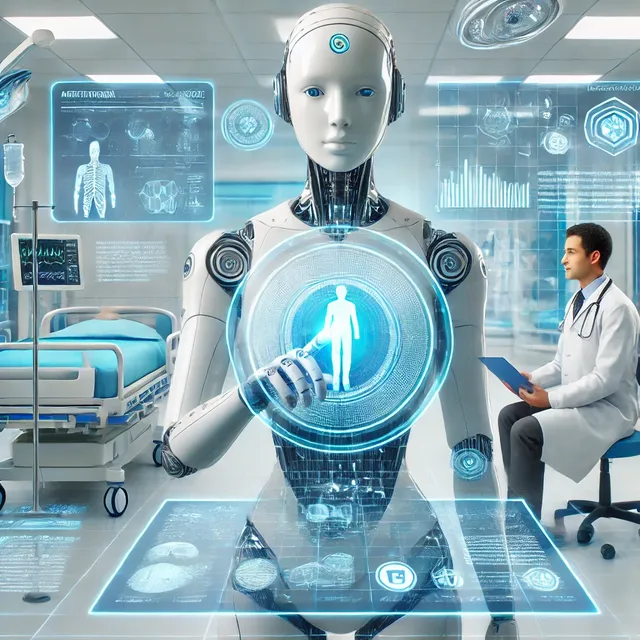
🤖 is revolutionizing the healthcare sector 🏥 by introducing faster diagnoses ⏩ and personalized treatments 🎯. With significant advancements 📈, 🤖 improves diagnostic accuracy 🔍, optimizes resources 💰, and places the patient at the center 🧑⚕️ of medical care.
Faster and More Accurate Diagnoses 🚀
🤖 processes large volumes of data 📊 in just seconds ⏱️, identifying patterns in exams such as X-rays 🌟, CT scans 🌀, and MRIs 🌈. These quick analyses 🏃♂️ help healthcare professionals detect serious conditions early 🕒, such as cancer 🩸, cardiovascular diseases ❤️, and neurodegenerative disorders 🧠.
Application Examples 🔍
- Algorithms that identify cancer cells 🧬 with high precision.
- Retinal analysis tools 👁️ that detect changes linked to diabetes 🍬.
- Systems that assess heart attack risks ❤️🔥 based on medical and behavioral patterns.
Personalized Treatments 🎯
Personalization in medical care ⚕️ is one of the greatest advantages of 🤖. Using genomic data 🧬, clinical histories 📜, and lifestyle information 🏋️, it is possible to create treatments tailored to each patient’s unique needs 🧩.
Benefits 🌟
- Higher effectiveness 🎯: Therapies designed for specific needs 🪄.
- Fewer side effects 🚫: Targeted approaches minimize adverse reactions ❌.
- Improved patient experience 🙌: Individualized care increases treatment adherence 🤝.
Application Examples 🧪
- Gene therapies 🧬 developed based on the patient’s DNA 🧫.
- Real-time ⏰ adjustments to medication doses monitored by 🤖.
- Predictive tools 📈 that optimize treatments for chronic diseases 🩺.
Democratization of Healthcare 🌍
🤖 expands access to healthcare, especially in remote areas 🌄 or those with limited resources 🚫. Technological solutions 📡 help address shortages of professionals and make diagnoses and treatments more accessible 🤗.
Impact Examples 🌐
- Telemedicine platforms 📞 connect patients with specialists from anywhere 🌏.
- Diagnoses performed by smartphone applications 📱 using 🤖.
- Systems that monitor and predict infectious disease outbreaks 💉, enabling rapid responses 🚑.
Challenges and Ethics ⚖️
Despite its benefits ✨, 🤖 faces challenges such as data privacy 🔒, algorithm transparency 📂, and proper regulations 📜. Addressing these issues is essential to ensure that technological advancements benefit society in a fair ⚖️ and ethical 🤝 manner.
Conclusion 🌟
🤖 is transforming healthcare 🏥 by offering faster ⏳ diagnoses and personalized treatments 🎯 that improve quality of life 🌈. While challenges remain ⚠️, the potential for innovation is vast 🚀, making medicine more efficient 💡, accessible 🌍, and patient-centered 🧑⚕️. The future of healthcare is being shaped today 🕒, with 🤖 as the catalyst for this revolution 🌌.
Upvoted! Thank you for supporting witness @jswit.
Downvoting a post can decrease pending rewards and make it less visible. Common reasons:
Submit